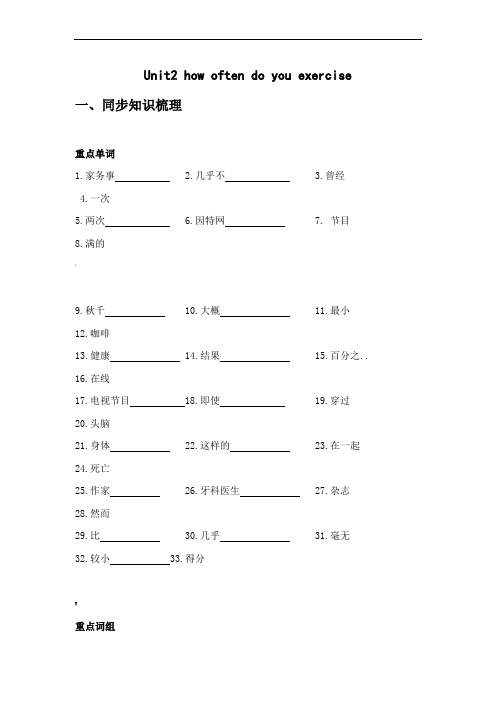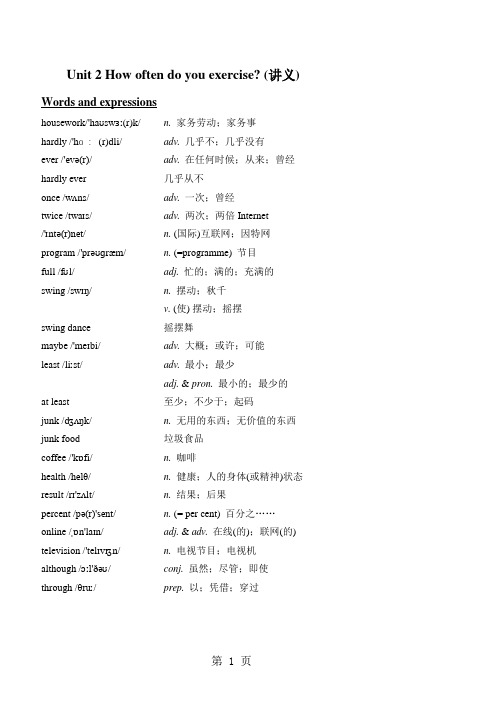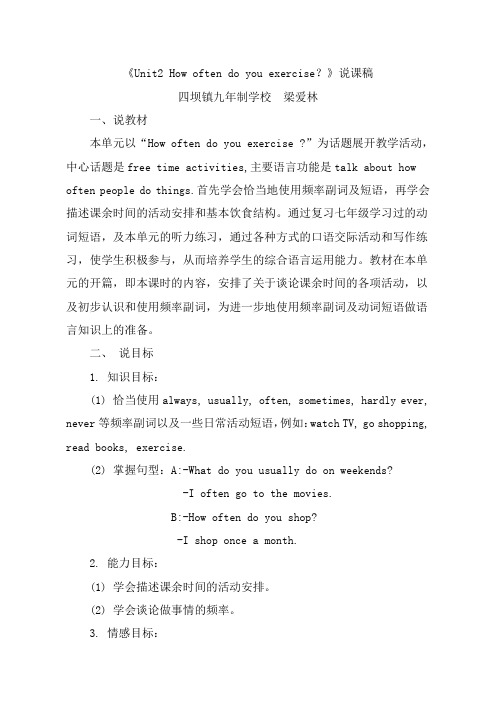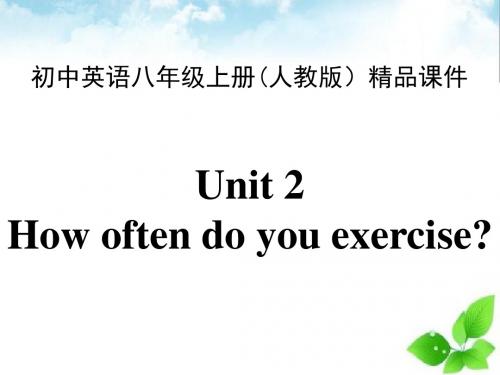精品 第三课时Unit 2How often do you exercise_B课件
- 格式:ppt
- 大小:1.51 MB
- 文档页数:16

Unit2 How often do you exercise?知识点讲解:1.主要频率副词的等级排序:always(总是)100% > usually (通常) 70%> often(经常) 50%> sometimes(有时)20% > hardly ever(很少) 5%> never(从不)0这些副词在句子中的位置,一般放在助动词、be动词或情态动词之后,行为(实义)动词之前。
即:“行”前“助(系)”后。
提问 always, sometimes, twice a day 等频率副词,用How often拓展:some time 一段时间;sometime某时;some times许多次/倍;sometimes 有时候顺口溜:分开是一段,相逢在某时,分开S表几次,相逢S会有时2.on weekends=on the weekend 在周末3.help用法help sb. with sth. 帮助某人做某事=help sb. (to) do sth.省to不定式:“一感”feel “二听”hear,listen “三使”make, have ,let “四看”look,see,watch,notice “半帮助”help4.Go+ v- ing : 表示进行某项活动。
go swimming/ shopping/skating/skiing/fishing/climbing/hiking5. free“空闲的” be free “自由的”拓展:freedom(n) 自由“免费的”:work for free.6.full “满的;饱的” be full of=be filled with 充满...的7.what kind of dance 那种类型的舞蹈8.How about…?…怎么样?(后跟名词\代词\V-ing)(用来提出意见或征求对方建议)9. 词语词义用法答语特征how long多久询问时间多久for/about+一段时间how often多久一次询问动作的频率often, twice a week等how soon多快,过多久询问时间多快in+ 一段时间how far多远询问距离多远ten minutes’ walkhow many多少询问可数名词数量数词+可数名词复数how much多少询问不可数名词数量数词+表示量的词+不可数名词多少钱询问价格数词+钱10.have to与musthave to 必须,不得不,强调受客观条件影响而不得不去做,有人称、数和时态的变化,,变一般疑问句时借助助动词do/does/did;must 表示主观愿望和想法,没有人称、数和时态的变化,通常是指禁止... 11.want用法(1)want (sb.) to do sth.=would like (sb.) to do sth.(2)want sth.,意为“想要什么”。

Unit2 how often do you exercise一、同步知识梳理重点单词1.家务事2.几乎不3.曾经4.一次5.两次6.因特网7. 节目8.满的)9.秋千 10.大概 11.最小12.咖啡13.健康 14.结果 15.百分之..16.在线17.电视节目 18.即使 19.穿过20.头脑21.身体 22.这样的 23.在一起24.死亡25.作家 26.牙科医生 27.杂志28.然而29.比 30.几乎 31.毫无32.较小 33.得分?重点词组1.2.几乎不 2.摇摆舞3.至少4.垃圾食品5.例如6.多于7.少于重点句型1.What do you usually do on weekends;I always exercise.2.What does she do on weekendsShe sometimes goes shopping.3.How often do you you go to the moviesI go to movies maybe once a month.Section Aoften do you exercise 你多久做一次运动—【解析1】how often/ how long / how far/ how soon辨析》【解析2】exercise v 锻炼=do sports= play sports【短语】take /have/do exercise 做运动 do morning exercise 做早操 do eye exercise 做眼保健操2.3.What do you usually do on weekends 你在周末做什么【解析1】频度副词【注】:频度副词表示多长时间做某事一次, 用在实义动词之前,系动词、助动词、情态动词之后。
We often clean the classroom every day. 【拓展】some time /sometime/some times/sometimes 【口诀】:分开是一段,合起是某时; 分开s 是倍次,合起s 是某时 (1)some time 一段时间,做时间状语 ;It takes sb. some time to do sth. 做某事花费某人多长时间(2)(3)sometime adv. 在某个时候,I hope to visit the USA _____ in the future.A. sometimesB. some timesC. sometime D . some time(3) some times 名词词组,“几次,几倍” sometimes=at times 有时 (一般现在时的标志词) 【解析2】weekend/weekday 辨析 【解析】on weekends = on Saturday and Sunday 在周末on weekdays= from Monday to Friday 在工作日3. Hardly ever 几乎从不【解析】hard (1)adv 努力地,猛烈地work hard 努力工作study hard 努力学习:(2) adj. 困难的,艰难的=difficult◆It’s hard/difficult for sb. to do sth. 做某事对某人来说是困难的It’s hard for us ____________(finish) the work without other ’s help.【拓展】hardly adv “几乎不,从来不”,表否定意义,常与can ,any ,ever 连用。

Unit 2 How often do you exercise? (讲义) Words and expressionshousework/'haʊswɜː(r)k/ n. 家务劳动;家务事hardly /'hɑː(r)dli/ adv. 几乎不;几乎没有ever /'evə(r)/adv. 在任何时候;从来;曾经hardly ever 几乎从不once /wʌns/ adv. 一次;曾经twice /twaɪs/ adv. 两次;两倍 Internet/'ɪntə(r)net/n. (国际)互联网;因特网program /'prəʊɡræm/ n. (=programme) 节目full /fʊl/ adj. 忙的;满的;充满的swing /swɪŋ/n. 摆动;秋千v. (使) 摆动;摇摆swing dance 摇摆舞maybe /'meɪbi/ adv. 大概;或许;可能least /liːst/ adv. 最小;最少adj. & pron. 最小的;最少的at least 至少;不少于;起码junk /dʒʌŋk/n. 无用的东西;无价值的东西junk food 垃圾食品coffee /'kɒfi/ n. 咖啡health /helθ/n. 健康;人的身体(或精神)状态result /rɪ'zʌlt/ n. 结果;后果percent /pə(r)'sent/n. (= per cent) 百分之……online /ˌɒn'laɪn/ adj. & adv. 在线(的);联网(的) television /'telɪvɪʒn/ n. 电视节目;电视机although /ɔːl'ðəʊ/ conj. 虽然;尽管;即使through /θruː/ prep. 以;凭借;穿过mind /maɪnd/ n. 头脑;心智body /'bɒdi/ n. 身体such /sʌtʃ/ adj. & pron. 这样的;那样的;类似的such as 例如;像……这样together /tə'geðə(r)/adv. 在一起;共同die /daɪ/ v. 消失;灭亡;死亡writer /'raɪtə(r)/n. 作者;作家dentist /'dentɪst/ n. 牙科医生magazine /ˌmægə'ziːn/ n. 杂志;期刊however /haʊ'evə(r)/adv. 然而;不过than /ðæn/ prep. & conj.(用以引出比较的第二部分)比more than 多于almost /'ɔːlməʊst/ adv. 几乎;差不多none /nʌn/ pron. 没有一个;毫无less /les/ adv. 较少;较小adj. & pron. 较少的;更少的less than 少于point /pɔɪnt/ n. 得分;点Claire /kleə/克莱尔 (女名)Sue /suː/ 休 (女名)American Teenager /'tiːneɪdʒə(r)/《美国青少年》(文中为虚构的杂志名称)Role-playJack: Hi, Claire, are you free next week?Claire: Hmm…next week is quite full for me, Jack.Jack: Really? How come?Claire: I have dance and piano lessons.Jack: What kind of dance are you learning?Claire: Oh, swing dance. It’s fun! I have class once a week, every Monday. Jack: How often do you have piano lessons?Claire: Twice a week, on Wednesday and Friday.Jack: Well, how about Tuesday?Claire: Oh, I have to play tennis with my friends. But do you want to come? Jack: Sure!Grammar FocusWhat do you usually do on weekends?What do they do on weekends? What does she do on weekends? How often do you go to the movies?How often does he watch TV? Do you go shopping? I always exercise.They often help with housework. She sometimes goes shopping.I go to the movies maybe once a month.He hardly ever watches TV. No, I never go shopping.Complete the questions with do or does. Then match the questions and answers.1.How often he play soccer?2. you drink milk?3.How often they stay up late?4. Sue eat a healthy breakfast?5.How often you eat apples?6. your parents play sports? a.Yes. She usually does.b.Hardly ever. I don’t like them.c.He plays at least twice a week.d.No, they don’t. They’re too busy.e.Never. They always go to bed early.f.Yes, I do. Every day.ReadingRead the article and fill in the blanks.What do No. 5 High School Students Do in Their Free Time? Last month we asked our students about their free time activities. Our questions were about exercise, use of the Internet and watching TV. Here are the results.We found that only fifteen percent of our students exercise every day. Forty-five percent exercise four to six times a week. Twenty percent exercise only one to three times a week. And twenty percent do not exercise at all!We all know that many students often go online, but we were surprised that ninety percent of them use the Internet every day. The other ten percent use it at least three or four times a week. Most students use it for fun and not for homework.The answers to our questions about watching television were also interesting. Only two percent of the students watch TV one to three times a week. Thirteen percent watch TV four to six times a week. And eighty-five percent watch TV every day! Although many students like to watch sports, game shows are the most popular.It is good to relax by using the Internet or watching game shows, but we think the best way to relax is through exercise. It is healthy for the mind and the body. Exercise such as playing sports is fun, and you can spend time with your friends and family as you play together. And remember, “old habits die hard”. So start exercising before it’s too late! Exercise% every day% 1-3 times a week% 4-6 times a week% no exerciseUse the Internet% every day Watch TV% 1-3 times a week % every day% 3-4 times a week % 4-6 times a weekExercises一、根据句子意思及汉语提示填写单词 (每空一词)1. (虽然;尽管) she is young, she can speak English verywell.2.Everyone knows that a good eating habit is good for our(健康).3.We all know that Mo Yan is a famous (作家).4.In our class, ninetygirls.(百分之……) of the students are5.Sid is lazy, so he (几乎不) exercises.6.Let’s go (在一起;共同)!7.The meeting room is (充满的) of people.8.Please do n’t tell mom the (结果) of the test. I want togive her a surprise.9. (在线的) shopping is popular among young people.10.Her mom goes shopping (两次) a week.11.—Do you know when the sports meeting is?—I don’t know. Let’s ask the monitor. (或许) he knows.12.Be early next time. You (几乎) missed the bus.二、单项选择( )13. Helen was so excited at the news that she could say a word.A.everB. almostC. hardlyD. always( )14. —Ms. Lin is very popular among the students.—Yes. Her classes are lively (生动的) and interesting.A. sometimesB. alwaysC. hardlyD. never( )15. We play sports on school days. You know, we don’t have enough time.A. oftenB. usuallyC. hardlyD. ever( )16. —How often do you go shopping?—ever. I don’t like shopping at all.A. UsuallyB. NeverC. HardlyD. Always( )17. —How often does your sister surf the Internet?—About .A. three timeB. three timesC. every day three timeD. three times a day( )18. —How often do you drink milk?A. Less than oneB. One or two hoursC. For a long timeD. Once or twice a day( )19. I think twenty percent of the students Wang Fei’s new songs.A. likes listening toB. like to listenC. likes to listenD. like listening to( )20. he is very tired, he doesn’t stop working.A. SoB. ButC. AndD. Although ( )21. it rained hard, he still worked in the field.A. Although; andB. Although; /C. But; althoughD. Although; but三、根据提示完成句子22.我至少一周打扫一次房间。

《Unit2 How often do you exercise?》说课稿四坝镇九年制学校梁爱林一、说教材本单元以“How often do you exercise ?”为话题展开教学活动,中心话题是free time activities,主要语言功能是talk about how often people do things.首先学会恰当地使用频率副词及短语,再学会描述课余时间的活动安排和基本饮食结构。
通过复习七年级学习过的动词短语,及本单元的听力练习,通过各种方式的口语交际活动和写作练习,使学生积极参与,从而培养学生的综合语言运用能力。
教材在本单元的开篇,即本课时的内容,安排了关于谈论课余时间的各项活动,以及初步认识和使用频率副词,为进一步地使用频率副词及动词短语做语言知识上的准备。
二、说目标1. 知识目标:(1) 恰当使用always, usually, often, sometimes, hardly ever, never等频率副词以及一些日常活动短语,例如:watch TV, go shopping, read books, exercise.(2) 掌握句型:A:-What do you usually do on weekends?-I often go to the movies.B:-How often do you shop?-I shop once a month.2. 能力目标:(1) 学会描述课余时间的活动安排。
(2) 学会谈论做事情的频率。
3. 情感目标:(1) 培养学生的逻辑表达能力,激发学生的积极思维,并使学生相互了解,增进友谊,加强人际交往,以形成良好的人际关系。
(2) 使学生了解哪些食品是垃圾食品,平时应多吃什么食物,怎样锻炼身体保持健康。
三、说学情八年级学生经过七年级的学习,已具有一定的英语综合能力,也积累了一定的英语词汇量,对空闲时间的活动已经知道如何正确表达。


Unit2Howoftendoyouexercise教材分析第一篇:Unit2 How often do you exercise教材分析Unit2 How often do you exercise? 教材分析一、教学目标:语言目标:描述时间频度的词汇及开展周末活动的调查二、能力目标听:能听懂谈论生活习惯、学习习惯和饮食习惯的对话材料。
说:能谈论生活习惯、学习习惯和饮食习惯。
读:能读懂介绍个人生活习惯的文章。
写:能写出Section A和Section B中的重点单词和重点句型,并能够描述自己的生活习惯三、情感目标通过开展周末活动调查问卷,引导学生正确处理好学习和娱乐之间的关系。
通过谈论谁的饮食习惯更健康,引导学生了解什么样的饮食习惯,才能保持健康的体质。
语言结构What do you usually do on weekends? I usually play soccer.How often do you shop? I shop once a month.语言功能Talk about how often you do things.教学重点掌握What do …? 和How often…?的句型。
掌握表示时间频度的词汇。
教学难点辨析:always usually often sometimes hardly never辨析:all most some no学习策略与思维技巧通过对比和反复操练,掌握频度副词间的区别和它们的具体用法。
教学课时: eight periodsSection A语言目标 What do you usually do on weekend? I usually play soccer.How often do you shop?I shop once a month.What do ….?How often…?引导的特殊疑问句、频度副词语言功能Talk about how often you do things.跨学科学习:学会养成良好的生活习惯。
Section A, 2d杰克:嗨,克莱尔,你下周有空吗?克莱尔:嗯……我下周已经安排得很满了,杰克。
杰克:是吗?怎么会呢?克莱尔:我在上舞蹈课和钢琴课。
杰克:你在学哪一种舞蹈?克莱尔:哦,摇摆舞。
它很有意思!我一周上一次课,在每周一。
杰克:你多久上一次钢琴课呢?克莱尔:一周两次,(在)周三和周五。
杰克:那么,你周二(干什么)呢?克莱尔:哦,我得跟朋友们打网球。
不过你想来吗?杰克:当然啦!Section B,2b第5中学的学生们在课余时间干什么?上个月,我们询问了我们的学生一些有关课余活动的问题。
我们的问题有关锻炼、使用网络,以及收看电视。
以下是(所获得的)结果。
我们发现我们的学生中只有百分之十五每天锻炼。
百分之四十五的学生一周锻炼四至六次。
百分之二十的学生一周只锻炼一至三次。
还有百分之二十的学生根本就不锻炼!我们都知道许多学生经常上网,但是让我们惊讶的是,有百分之九十的人每天使用网络,另外百分之十的学生每周至少使用网络三至四次。
绝大多数学生上网娱乐,并非为了做功课。
对我们提出的有关看电视的问题的回答也颇有意思。
只有百分之二的学生一周看一至三次电视,百分之十三的人一星期看四至六次电视。
另外百分之八十五的人每天都看电视!虽然许多学生喜欢观看体育节目,但游戏类节目却是最受欢迎的。
通过使用网络或观看游戏类节目来放松是件好事,但我们认为最佳的放松方式是通过锻炼。
它有益于身心的健康。
诸如参加体育运动这样的锻炼方式不但有趣,而且当你和朋友、家人一起运动时,你们还可以共度时光。
请记住:“旧习难改。
”所以赶快锻炼起来,不要等到来不及了。
Unit2 How often do you exercise?知识点归纳与练习Section A 知识讲解一. hel p with housework 帮助做家务1. help with sth.意为帮助做某事”2. help sb. with sth. = help sb. ______________ sth.帮助某人做某事Eg: I ofte n help him ___________ his En glish. = I ofte n help him __________________【拓展】1. help oneself to请随便吃 /喝 -PIease help yourself to some cakes.2. can ' t help doing sth 情不自禁做某事I can ‘ t help falling in love with that girl.我情不自禁爱上那个女孩。
二. housework 意为 家务劳动”。
不可数名词。
1. They have ___________ housework to do. A. many B. much三. sometimes 有时辨析:sometimes , some times , sometime , some time sometimes 有时候。
=attimes= from time to time 也是 有时”的意思。
some times 几次。
time 作可数名词时可作次数"解;表示 时间"时是不可数名词。
sometime 某个时候。
可指过去或将来的某个时候。
some time 一段时间。
常与 for 连用。
对它提问用 how long 。
口诀记忆:分开 一段时间”;相聚 某个时候”。
四. hardly ever 几乎不①hard 作形容词时,意为困难的;硬的;勤奋的;严厉的;苛刻的hard 作副词常用来表示程度,意为 努力地;猛烈地;剧烈地 ”,位于动词后。
Unit2 how do you often exerciseSection A1. on weekends在周末weekend指星期六和星期天weekday工作日2. help with housework 帮忙做家务help (sb) with sth帮(某人)做某事,with后用名词【拓展】1) help sb (to) do sth 帮助某人做某事2) help (to) do sth 帮忙做某事3) help onese lf to… 请随便吃/喝···Please help yourself to some cakes. 请随便吃一些蛋糕吧。
4)can’t help doing sth 情不自禁做某事I can’t help falling in love with that girl. 我情不自禁爱上那个女孩。
3.【拓展】(1)这些副词在句子中的位置基本相同,一般放在助动词、be动词或情态动词之后,行为动词之前。
即:“行”前“助(系)”后。
Peter is always late for school. Peter上学总是迟到。
(2)hard、hardly和hardly everHe can hardly play football. 他几乎不会打篮球。
4、exercise (1)作不及物动词,意为“锻炼、运动”。
— How often do you exercise? 你多久锻炼一次?— I exercise every day. 我每天都锻炼。
(2)作不可数名词,意为“锻炼、运动”,常与动词take连用。
Exercise makes me keep healthy. 运动使我保持健康。
John likes take exercise in the open air. 约翰喜欢在户外锻炼。
(3)作可数名词,意为“练习;操”。
We do morning exercises every day. 我们每天做早操。